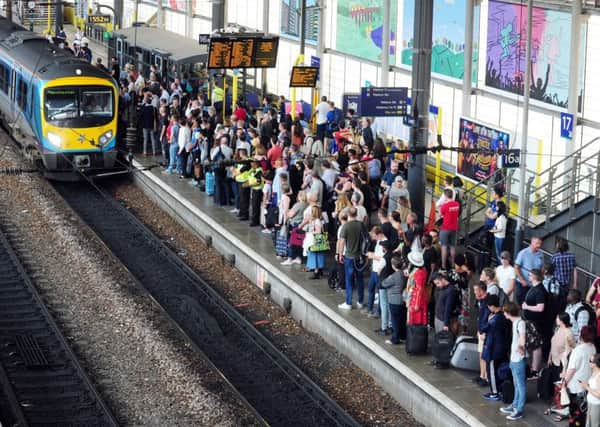Rob McIntosh: Trans-Pennine services set to be transformed


Critics suggest that what is planned is somehow short-changing communities and economies on this route. I do not agree.
What is clear is that demand for Britain’s railways has grown at an astonishing rate over the past 20 years as anyone who has caught a rush-hour train can confirm.
Advertisement
Hide AdAdvertisement
Hide AdThose who don’t travel regularly will know from their newspapers and bulletins that travelling at peak-times has become an increasingly difficult experience – particularly on the trans-Pennine route from York through Leeds, Huddersfield and on to Manchester.
A railway that was first designed and built in the 1840s is creaking under the strain.
The (rightly) well-documented introduction of the May 18 timetable, intended to help the situation, unfortunately only served to make things worse and we are taking steps to put that right.
But there is a major plan to change things.
Network Rail, on behalf of the UK Government, is delivering £2.9bn of enhancements as the next phase of investment in the North’s railway between York and Manchester.
Advertisement
Hide AdAdvertisement
Hide AdSome areas will see the amount of track doubled from two to four; line speeds will increase; stations will be rebuilt to modern standards; electrification introduced where it generates the most benefit; and the UK’s first inter-city digital railway will be introduced.
The planned improvements will cut valuable time off a weekly commute that can instead be spent with the family; provide extra capacity for more trains and treble the number of seats compared to today.
This will culminate in a high-performing, dependable railway, delivered incrementally, all while maintaining connectivity between York, Leeds and Manchester.
In this phase of improvements, we will electrify two-thirds of the trans-Pennine route – allowing passengers to feel the benefit of the work as quickly as possible.
Advertisement
Hide AdAdvertisement
Hide AdWe have worked hard to find a balance between producing the maximum benefits within a time period of disruption that passengers can tolerate, while keeping as many trains as possible running across the Pennines.
There’s a tipping point – a law of diminishing returns – where the benefits of just ‘doing more’ are outweighed by the added time needed to deliver, and the unpalatable levels of disruption.
This suite of improvements paves the way for more in the future when additional funding may become available.
The improvements will not only deliver the above benefits incrementally over the next five years but will, in some cases literally, prepare the ground for further infrastructure investment in the future, with continuous electrification and additional capacity for freight being prepared now to make their introduction much less disruptive and more cost-effective in the future.
Advertisement
Hide AdAdvertisement
Hide AdThis phase of investment delivers the maximum benefit for passengers over the timeframe whilst minimising overall disruption.
It paves the way for us to work with stakeholders to secure future funding for further phases of investment.
And while there will be some unavoidable periods of change to train services while these improvements are delivered, the result will be a transformation that, once again, makes our railway fit to support the growth of the communities and economies it serves.
Rob McIntosh is Network Rail’s Route Managing Director for London North Eastern and East Midlands.